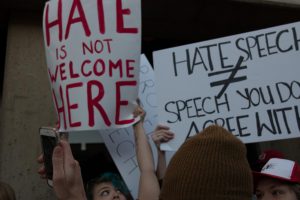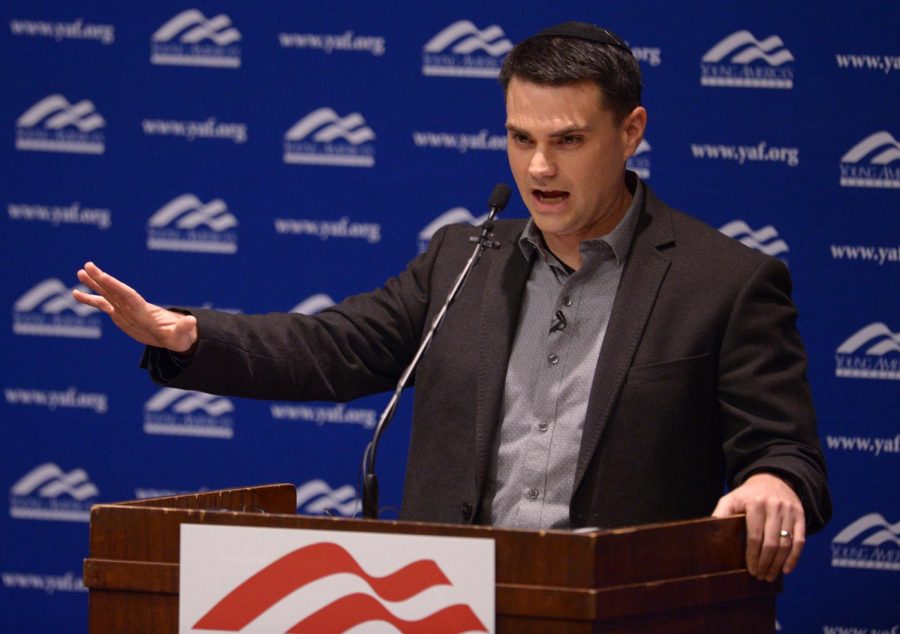Dalley: Universities Should Not Host Speakers Who Play Fast and Loose With Facts
(Leah Hogsten | The Salt Lake Tribune/pool) Controversial conservative commentator Ben Shapiro, editor-in-chief of the Daily Wire and former editor-at-large of Breitbart News, addresses the student group Young Americans for Freedom at the University of Utah’s Social and Behavioral Sciences Lecture Hall, Wednesday, September 27, 2017. Shapiro was invited by the student organization sponsored by Young America’s Foundation, the parent organization over campus Young Americans for Freedom chapters, not the university itself.
November 20, 2019
Our commitment to freedom of speech is directly tested when that speech is coming from someone we disagree with. The University of Utah felt this in 2017 when Ben Shapiro was invited by the group Young Americans for Freedom to speak on campus. Shapiro was met with protests and many student groups called for him to be disinvited from speaking on campus, as he espouses views that are homophobic, transphobic, sexist, racist and otherwise extreme, which many on campus strongly disagreed with. Unsurprisingly, his speech hit all of those topics and carried into a few others such as the wage gap, motherhood and women working outside the home.
Shapiro is absolutely a controversial figure to invite to campus and often toes the line of social acceptability. The Daily Utah Chronicle published an opinion piece shortly after Shapiro’s speech that expressed the controversy-chasing well. It argued that, “The reason students on the right get so much glee out of these events is the lack of conversation or debate between students in general. We have all moved so far to each end of the spectrum that most conversations about current political issues don’t even have the possibility of common ground and end in insults. The event promises a platform in which students have to engage with Shapiro in a formal manner, creating a strange world in which Shapiro functions as an intellectual hit-man for students on the right.”

Freedom of speech on American college campuses remains a hotly debated issue. We must work to find policy that sets clear societal expectations while also maintaining the integrity of freedom of speech as a founding value of our country. Within these discussions, it is important to note that freedom of speech does not include behavior that crosses the line into harassment or threats, or that creates a hostile environment for vulnerable students. Speech that is merely offensive or otherwise bigoted does not cross that threshold. When speech is believed to have crossed the line, it must be reviewed on a case-by-case basis in order to ensure that freedom of speech is not being suppressed or otherwise punished.
While I vehemently disagree with the views that Shapiro presents, my issue with Shapiro isn’t with his speech, it is with his methods of sharing information. In my opinion, he and those who adopt similar speaking styles should not be allowed on campus because they often misrepresent ideas that are absolutely false, respond to debate with bad faith arguments and engage in academic dishonesty by basing claims off of mere hunches represented as factual evidence.
For example, Shapiro did an AMA on the subreddit r/politics where he invited people to ask him questions, which he then would respond to. and he would respond to them. One of those questions was, “Hi Ben. I was wondering, how’s Kansas doing after their relatively large tax cuts? Is the wealth ‘trickling down?’ Thanks.” Shapiro didn’t answer this question, but he has addressed similar ideas before. Basically, his argument boils down to the idea that taxing corporations, raising the minimum wage, or reducing the wealthy’s income would halt creation and cut stimulus from the economy. While making this argument, Shapiro breaks down the issue in a seemingly logical way, stating it as if he is supported by mountains of research and data. But there is currently no evidence to supports his ideas. Business growth, recessions and increased innovation have existed in most tax systems, and researchers have not reached an academic consensus on how tax cuts or increased taxation affect the growth of the economy. The fact is, it is objectively true to state that we have no proof that trickle-down economics works. This is not an opinion — it is an honest analysis of the data that we currently have, and to state otherwise is to misrepresent the existing data.

While Shapiro claims that “facts don’t care about your feelings,” he is very willing to engage in name calling and bad faith arguments. When commenting on the politics of the Obama Administration, he consistently labeled Obama and the left as fascist Nazis instead of engaging in actual analysis of the situation. The objective was never constructive — it was only about delivering an attack.
If I attempted to do what Shapiro does in a classroom setting, I would be dismissed from the university. In order to protect the academic integrity of the institution, universities need to craft a policy that will unbiasedly prevent the display of rhetorical elements the university would otherwise not deem acceptable.
I don’t support Ben Shapiro in any way shape or form, but he has every right to make speeches. However, universities are institutions that must stand for high academic standards and honesty. To allow Shapiro and those who engage in similar rhetorical tactics — including those on the left — is to lower the standards of the university and to give students poor examples to emulate.









Lukas • Nov 22, 2019 at 8:51 am
I completely agree! Colleges should be a place of educated and well-reasoned debate, not for spewing lies and falsehoods to stir up rabid supporters.